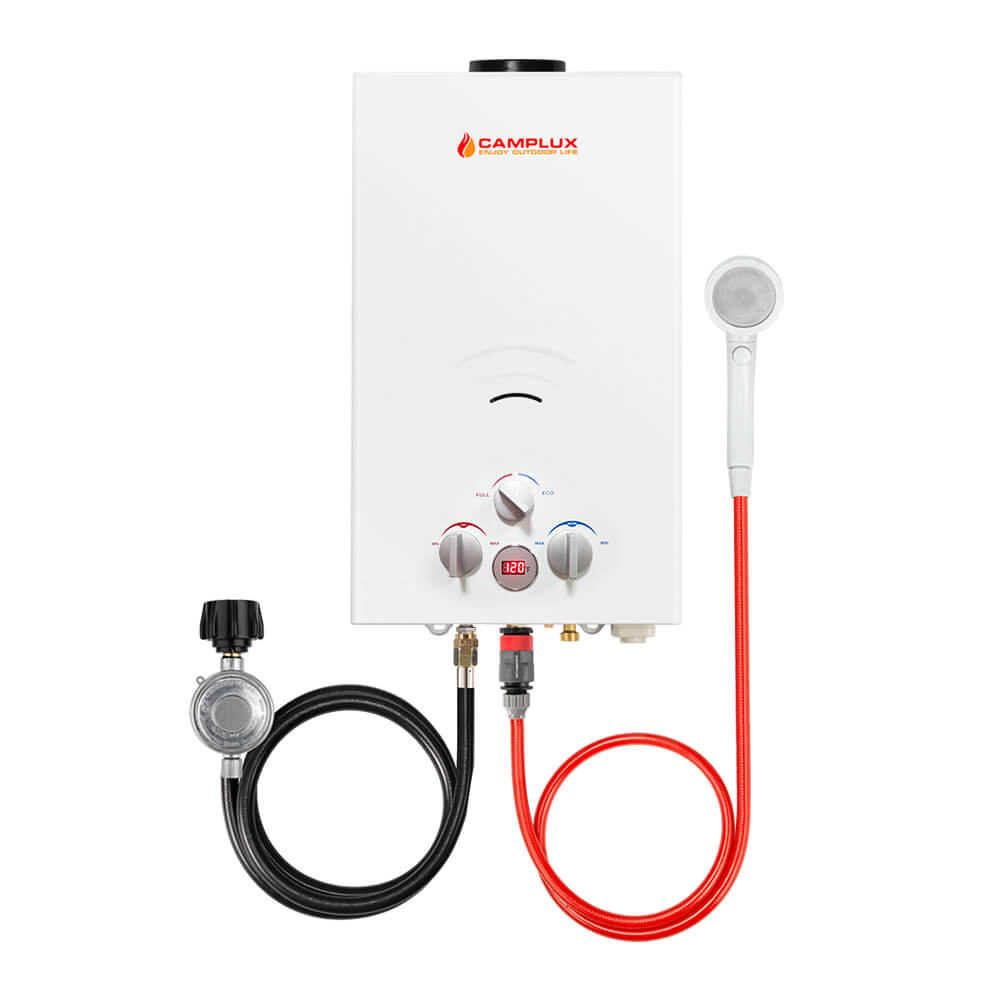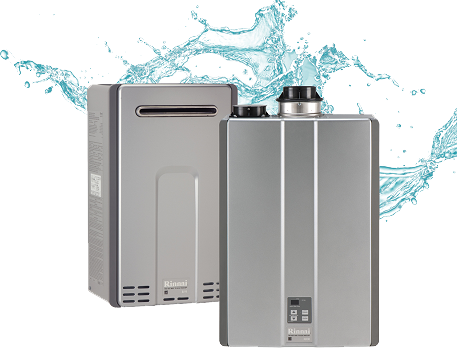Discovering The Gains Of Continuous-Flow Water Heaters
Discovering The Gains Of Continuous-Flow Water Heaters
Blog Article
What're your ideas regarding Six Benefits of a Tankless Hot Water Heater?

In a globe where ease and performance preponderate, it's not a surprise that homeowners are regularly in search of smarter means to handle their home's energy intake and convenience. One technology that has actually continuously gained popularity is the tankless water heater. But just what makes these systems stand apart from the conventional tank-based designs most of us matured with? Let's dive in and explore the benefits of tankless hot water heater, aiding you make a decision if it's time to make the button in your house.
Introduction
Image this: you step into the shower after a long day, expecting a soothing waterfall of warm water, only to be greeted by icy droplets because the last individual utilized all of it up. Sound acquainted? Conventional hot water heater save a fixed quantity of warm water, meaning you're at the mercy of that container's supply. Tankless systems, on the other hand, heat water on demand. No more going out mid-shower, say goodbye to wrestling with timetables simply to guarantee warm water is available.
Recognizing Tankless Water Heaters
What Are Tankless Water Heaters?
Tankless hot water heater, often called on-demand or immediate water heaters, provide warm water just as it's needed. Rather than keeping gallons of pre-heated water, these devices kick right into action the minute you turn on the tap. Water travels through a warmth exchanger, warming up in real-time, suggesting you get an undisturbed circulation of hot water without the requirement for a huge container sitting idly by.
How Do They Differ from Conventional Solutions?
Typical heating systems hold a storage tank of hot water, making use of energy to keep that container at a consistent temperature. Tankless systems remove the standing supply, cutting down on squandered energy and the bulky footprint of a big cyndrical tube. Basically, you're updating from a "accumulation" state of mind to a "made-to-order" strategy.
Common Types of Tankless Units
Tankless hot water heater generally are available in 2 varieties: gas and electric. Gas models often tend to deliver higher circulation prices, suitable for larger households, while electrical designs commonly serve smaller sized homes and are usually simpler to install. Furthermore, some systems are created for point-of-use (serving one component) while others can take care of the whole home's warm water demands.
Secret Advantages of Tankless Hot Water Heater
Power Effectiveness and Cost Savings
Say goodbye to heating up a giant tank's worth of water and maintaining it warm all the time. Tankless heating systems reduce standby energy losses, which can reduce energy costs. While the preliminary cost could be higher, the long-lasting savings usually justify the financial investment.
3. Space-Saving Design
If your home is short on storage, getting rid of the cumbersome storage tank liberates valuable area. Tankless units are compact and can frequently be installed on wall surfaces, concealed in edges, or mounted in limited utility closets without having all to oneself the entire room.
4. Longer Life expectancy
A properly maintained tankless water heater can outlive its tank-based relative. Standard tanks might last 10-15 years, while tankless models can maintain downing along for 20 years or even more, making them a solid financial investment gradually.
1. Unlimited Hot Water Supply
Ever before had to set up showers so everybody gets their reasonable share of hot water? With tankless, that becomes a thing of the past. As long as the heater's flow capability isn't gone beyond, you can take back-to-back showers without turning into a popsicle.
5. Improved Water Top Quality
Saving water in a container can in some cases result in sediment build-up or a somewhat "off" preference. With tankless systems, fresh water is heated instantly, lowering the chances of sediment buildup and potentially using cleaner-tasting water.
Considerations Prior To Changing
Though the advantages are compelling, it's a good idea to think about a couple of aspects prior to completely committing.
Assessing Your Home's Water Use Patterns
If your house concurrently uses multiple fixtures with high warm water need, see to it the system's circulation rate satisfies your needs. Knowing your usage patterns helps you choose the ideal size and sort of tankless heating system.
Upkeep and Treatment Tips
Tankless systems are relatively low maintenance, however they aren't set-it-and-forget-it home appliances.
Normal Cleansing and Descaling
Tough water minerals can accumulate in the warmth exchanger, affecting efficiency. Regular descaling (frequently advised annually) keeps the device going for peak performance.
Annual Professional Assessments
A yearly checkup from a professional ensures minor concerns are caught early. They'll evaluate the device's performance, look for leakages, and help keep optimal effectiveness.
Initial Investment Expenses
Tankless heating units commonly feature a greater in advance price tag. Between the unit itself and possible setup adjustments, the preliminary price may provide you sticker shock. But keep in mind to watch it as a long-lasting investment.
Installation Requirements
Relying on your home's facilities, you might need extra electrical ability or gas line upgrades. Guarantee you recognize the installation demands and speak with a specialist to prevent shocks.
Ensuring Proper Air Flow
For gas versions, correct ventilation is necessary to securely get rid of exhaust gases. Make sure venting systems are tidy and correctly installed to stop any kind of prospective security dangers.
Comparing Different Brands and Models
Not all tankless hot water heater are produced equivalent.
Looking Into Trusted Suppliers
Search for trusted brands with a background of producing high quality units. A trusted maker frequently supplies far better consumer support and longer warranties.
Installment: DIY or Professional?
While some house owners relish taking on projects themselves, tankless setup might not be the very best time to break out the toolbox.
Pros and Cons of Do It Yourself Installation
A do it yourself mount might save money, however it includes threats. Wrong installment can result in inefficiency or security issues. If you come in handy and have experience, it might be practical-- yet wage caution.
Reading Testimonials and User Feedback
Customer evaluations and responses from next-door neighbors or good friends that have actually gone tankless can provide useful understandings. Occasionally, real-life experiences can be a lot more telling than marketing brochures.
When to Call a Professional Plumbing
For most, calling a professional ensures every little thing's done correctly. A specialist plumbing professional understands regional codes, sizing requirements, and venting parameters, lowering the danger of accidents.
Taking full advantage of Effectiveness
You've bought a tankless unit-- now optimize its effectiveness.
Ideal Temperature Level Setups
Most individuals set their units between 120-140 F. Readjusting the temperature can enhance comfort and savings. Experiment to find a wonderful area that doesn't squander energy.
Pairing with Low-Flow Fixtures
Intend to extend your system's capacities? Consider installing low-flow showerheads and taps. They minimize water use, allowing your tankless system to provide a stable stream of hot water without straining.
Ecological Effect
Tankless hot water heater align with greener living objectives.
Decreased Carbon Footprint
By using less power and only heating water as needed, tankless systems can reduce your home's carbon impact, lowering your ecological influence.
Conserving Natural Resources
Much less energy consumption and less squandered hot water equate into less natural deposits being used, an ecological win-win.
That Benefits A Lot Of from Tankless Heaters?
The elegance of tankless heaters is that they can fit a range of homes.
Large Households vs. Solitary Owners
Huge households might like the countless warm water supply, while single passengers value the energy savings from not warming a whole container for just one person's early morning shower.
Home Owners with Restricted Area
If your home is short on square video, losing the cumbersome storage tank frees up space for other fundamentals-- or maybe just much more elbow room.
Eco-Conscious Consumers
Going tankless aligns with environmentally friendly worths, ensuring you're not wasting power or resources.
Future Patterns in Tankless Water Heaters
The world of home devices is ever-evolving, and tankless hot water heater are no exception.
Developments in Innovation
R&D is frequently improving warmth exchangers, making units extra reliable and long lasting. Future versions may be even quieter, much more compact, and far better fit for differing environments.
Smart Home Assimilation
Think of readjusting your hot water heater's temperature via an app or getting maintenance informs on your phone. As smart home tech breakthroughs, we'll see more connectivity and ease.
Conclusion
Choosing a tankless water heater is more than simply updating your home's warm water system; it's purchasing long-lasting convenience, energy efficiency, and a greener way of living. By considering your family's water usage, bearing in mind installation requirements, and devoting to normal maintenance, you can take pleasure in a consistent stream of hot water without the luggage of a bulky container. As innovation evolves, you can expect even smarter, much more reliable tankless remedies that not only make your life much easier but additionally benefit the earth.
Pros and Cons of Tankless Water Heaters
Tankless Water Heater Pros
Saves Energy: Simply put, you re spending less energy to create hot water, so your total carbon footprint goes down, not to mention your bills. Lasts Longer Than Storage Tanks: Storage tank units need to be replaced every 15 years or so. But tankless units? They can last for 30 years before they give out on you. Constant Hot Water: Need to take a shower and don t want the water running cold? Awesome it won t. The water will stay hot the entire time because it creates hot water on demand. Saves You Money: Less water usage equals less money. Beyond that, you re not paying to keep water hot 24/7. Those savings add up quickly. Better for the Environment: Less water waste is better for everyone. It saves you money, but it s also environmentally conscious at the same time. Tankless Water Heater Cons
It Can Take a Minute: Depending on your specific unit and its placement, it can take anywhere from 10 seconds to 2 minutes to fully heat up. Because there s no storage tank, it heats water as you need it. Upfront Purchase Price: While we talked about their longevity, there s sticker shock when you look at brand-new tankless units to install. It pays for itself, but it s still a big chunk of change at first. Has its Limits: If you run multiple appliances at once, such as the dishwasher, washing machine, and maybe you take a shower at the same time, there might not be enough hot water. https://www.airsouthnow.com/blog/water-heater-service/pros-and-cons-of-tankless-water-heaters/

I am just very enthusiastic about and I'm hoping you enjoyed the new article. If you liked our blog posting if you please consider to share it. Thank you so much for going through it.
Free Estimate Report this page